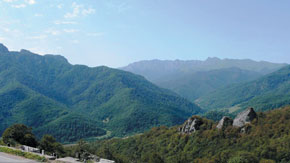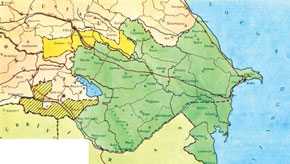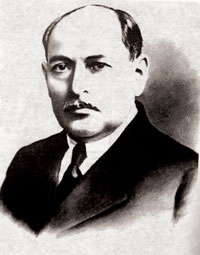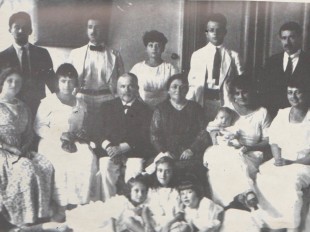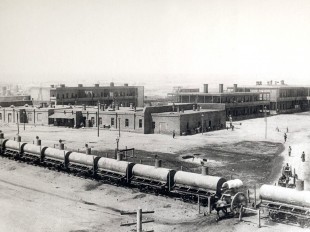How Azerbaijan Offered Part of its Land to Armenia
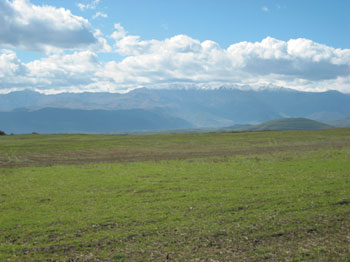 Zangezur mountainous, mountain range that defines the border between Armenia´s southern province of Syunik and Azerbaijan´s Nakhchivan Autonomous Republic Pages 54-61
Zangezur mountainous, mountain range that defines the border between Armenia´s southern province of Syunik and Azerbaijan´s Nakhchivan Autonomous Republic Pages 54-61
by Dr. Ismail Musayev
The region of Zangezur, bordering Iran, was given by Azerbaijan to Armenia in turbulent 1920. In the first of two articles for Visions, Dr Ismail Musayev, Professor of Diplomacy at Baku State University, looks at the circumstances that led Azerbaijan to give Zangezur away.
Armenia stepped up its territorial claims on Zangezur in autumn 1920. Soviet Russia continued to take the Armenian position, paying scant regard to the Azerbaijani leaders´ international outlook and their readiness to consent to the reoccupation of the South Caucasus under the guise of the introduction of Soviet power.
 Zangezur mountainous, mountain range that defines the border between Armenia´s southern province of Syunik and Azerbaijan´s Nakhchivan Autonomous Republic
Zangezur mountainous, mountain range that defines the border between Armenia´s southern province of Syunik and Azerbaijan´s Nakhchivan Autonomous Republic by Dr. Ismail Musayev
The region of Zangezur, bordering Iran, was given by Azerbaijan to Armenia in turbulent 1920. In the first of two articles for Visions, Dr Ismail Musayev, Professor of Diplomacy at Baku State University, looks at the circumstances that led Azerbaijan to give Zangezur away.
Armenia stepped up its territorial claims on Zangezur in autumn 1920. Soviet Russia continued to take the Armenian position, paying scant regard to the Azerbaijani leaders´ international outlook and their readiness to consent to the reoccupation of the South Caucasus under the guise of the introduction of Soviet power.
Soviet Russia keen to see through land transfer
The government of what had been independent Azerbaijan, the Milli Shura (National Council), signed a treaty on military and economic union with the Russian Soviet Federated Socialist Republic (RSFSR) on 30 September 1920. By so doing the Azerbaijani government hoped to ensure their country´s territorial integrity, to establish joint socialism and to ease the pressure from Soviet Russia. The government had made some new proposals to solve contentious issues. A meeting of the Baku Soviet on 2 November 1920 adopted the following decision: "The People´s Commissariat on Foreign Affairs is charged with approaching the Armenian government once more with a proposal to conduct talks on solving all contentious issues and in order to establish good relations." After the decision had been approved at the Azerbaijani Communist (Bolshevik) Party´s second congress on 16 October 1920, an invitation to attend an Azerbaijani-Armenian Conference was one of several proposals made to the Armenian government.
The Armenians conveyed their consent to the conference in a note and suggested a neutral place or an Armenian city as the venue for the talks. The Azerbaijani government wanted to hold the conference in Baku, but on account of the Armenians´ actions the negotiations did not take place.
In parallel with this, negotiations with Russia´s representative, B. Legran, continued in Irevan and a draft agreement between Soviet Russia and Armenia was in preparation. Several diplomatic documents show that Azerbaijani national interests were being seriously undermined and it was planned to give its historical land, Zangezur, Karabakh and Nakhchivan, to Armenia. At this time, the Russian government was operating on the basis of leading Communist Ordzhonikidze´s thesis: "… we may need Armenia in certain political situations".
Russia´s Eastern policy involved using Azerbaijani land, in particular the aforementioned regions, as "small change" in making Armenia Soviet. This is confirmed by the slogans that were used by the Soviet leaders in the region (initially "Only the Soviet government can ensure Azerbaijan´s territorial integrity", but later "Only the Soviet government can return Zangezur to Armenia and make Azerbaijan give autonomy to Karabakh").
The negotiations in Irevan ended in the signing of a protocol, forcing the parties to recognize a future peace agreement. Under this agreement Armenia would give up its claims on Karabakh but receive Nakhchivan and Zangezur. (Matters were developing according to Ordzhonikidze´s plan, who was dubbed by Stalin the "conqueror of Azerbaijan", "first to achieve the transfer of Nakhchivan and Zangezur to Armenia and then make Azerbaijan give autonomy to Mountainous Karabakh".) All this and subsequent events give grounds to say that Russia had planned in advance the transfer of Azerbaijani land, first of all Zangezur, to Armenia and managed to do this easily because of the Azerbaijani leaders´ internationalist outlook.
A joint meeting of the Politburo of the Central Committee of the Azerbaijani Communist Party (Bolshevik) and the Caucasian Buro of the Central Committee of the Russian Communist Party (Bolshevik) on 4 November 1920 adopted a decision on the terms of the Russian-Armenian agreement: "The article on the transfer of Nakhchivan and Zangezur to Armenia is neither politically nor strategically expedient and can be achieved only at the end." It is worth noting that Stalin and Ordzhonikidze took part in this meeting as representatives of the Communist Party leadership.
Azerbaijani Communist leader Nariman Narimanov was given the task of substantiating the Politburo´s position on Nakhchivan and Zangezur. At the same time it was agreed not to make a final decision on the agreement until Stalin had discussed the issue with the Central Committee of the Russian Communist Party (Bolshevik).
The decision shows once more that Azerbaijani land was auctioned off. Its fate was not decided from the point of view of Azerbaijanis´ historical rights and interests but from the point of view of the political and strategic expedience for the state, ideology and system.
Stalin´s opinions during the joint discussion of the "Zangezur problem" in the meeting of the Azerbaijani Communist Party and Baku Committee in Baku on 9 November 1920 prove the point: If you want to know who Zangezur and Nakhchivan belong to, they should not be given to Armenia´s current government, but if Soviet government is established there, then they can be given to them.
He also made the following cunning, but at the same time ridiculous, remarks: "I´m not in favour of Azerbaijan´s independence. One group of communists cannot be independent from another."
Azerbaijani Communist Party decides on land transfer
The decisions of the 30 November meeting of the Central Committee of the Azerbaijani Communist Party (Bolshevik) were of great "service" in giving part of Zangezur to Armenia. The ethnicity of the participants in the meeting must also be taken into consideration in attempts to explain these decisions. They included Ordzhonikidze (Georgian), Sarkiz (S. Ter-Danielyan - Armenian), Y. Stasova and G. Kaminskiy (Russian) and Nariman Narimanov, A. Qarayev and M. Huseynov (Azerbaijani). The third issue on the meeting´s agenda, "the telegram on the Armenian Revolutionary Committee´s proclamation of Soviet power in Armenia" was discussed and a broad decision adopted.
The third article of the decision says: "There is no border between Soviet Azerbaijan and Soviet Armenia." The main point of the meeting and decision is expressed in article four, which says that Nakhchivan and Zangezur are transferred to Armenia. Other articles say that the mountainous part of Karabakh is given the right to self-determination and Soviet Azerbaijan forms an indestructible military and economic union with Soviet Armenia (this refers to oil as well). The decision instructed Nariman Narimanov to prepare a statement on all these issues and announce it a meeting of the Baku Soviet.
Another step towards "offering" Zangezur to Armenia was taken on 1 December 1920 when Narimanov made the Statement at a grand, "historic" meeting on the establishment of Soviet power in Armenia. What has entered history as Narimanov´s Statement was published in the newspapers Kommunist (2 December 1920, issue No 178) and Bakinskiy Rabochiy (3 December, 1920, No 23), but was not published again in Azerbaijan. But the statement was published in Armenia´s Kommunist (7 December 1920) in Irevan with falsified content and text in order to raise in future the question of Mountainous Karabakh.
Nariman Narimanov protested at the falsification of the statement - the phrase "the peasant workers of Mountainous Karabakh are granted the right to self-determination" was replaced with the recognition of Mountainous Karabakh "as a part of the Armenian Soviet Socialist Republic". The statement says: "Soviet Azerbaijan, assisting the struggle of the Armenian workers against the Dashnak power, which has shed and is shedding the innocent blood of our best communist comrades in Armenia and Zangezur, declares that henceforth no territorial issue can lead to mutual bloodshed between centuries-old neighbouring peoples - the Armenians and Muslims; the territory of Zangezur and Nakhchivan are integral parts of Soviet Armenia; the peasant workers of Mountainous Karabakh are granted the right to self-determination; all combat operations within Zangezur are stopped and the forces of Soviet Azerbaijan withdrawn." It goes on to say that Soviet Azerbaijan opens the doors wide to all its inexhaustible wealth - oil, kerosene and so on - to Soviet Armenia.
The Baku Soviet adapted a unanimous resolution on the issue, expressing its full approval of the Narimanov Statement. They also said that the document "opens a new page in the history of the South Caucasus and Eastern nations, ending forever the centuries-old enmity and bloody wars between Armenia and Muslims".
Many archive documents confirm that Stalin played a major role in the division of Azerbaijani territories and "explained" this as follows: "On 1 December Soviet Azerbaijan willingly gives up the disputed territories and proclaims the transfer of Zangezur, Nakhchivan and Mountainous Karabakh (the statement on Upper Karabakh was distorted here too - I.M.) to Soviet Armenia." In his speech at the Baku Soviet meeting, Ordzhonikidze applauded the decision of the "Armenian people" (his own expression - I.M.) to fly the Soviet flag, describing the statement as "an historic act of great significance, unparalleled in human history". Downplaying the strategic importance of the Azerbaijani regions, he said: "Zangezur, Nakhchivan and Karabakh mean nothing for the Russians; Zangezur is unproductive mountains, it has no grain, no water, Nakhchivan has no more than bogs and malaria, while Karabakh has nothing at all. And Comrade Narimanov says: ´Take them yourselves. Take these unproductive lands for Armenia.´ As though Soviet Azerbaijan were freeing itself of a burden." (The highlighting is ours - I.M.)
When Ordzhonikidze informed one of the Armenian Communist leaders, Nazaretyan, about the statement, the latter responded that the press would praise Azerbaijan. On 2 December 1920 Ordzhonikidze informed Lenin and Stalin that "Azerbaijan officially proclaimed the transfer of Zangezur, Nakhchivan and Mountainous Karabakh (the latter is a distortion - I.M.) to Armenia yesterday."
Protests against the land transfer
Plenty of people foresaw the current and future bitter consequences of the transfer ("offering") of Azerbaijani territories to Armenia and protested against it. The founder of the Azerbaijan Democratic Republic, Mammad-Amin Rasulzada, wrote: "As soon as Bolshevik government was established in Armenia, Russian policy made a grand present to Armenia, through the generosity of Nariman Bay, of Zangezur and Nakhchivan which just two days ago it had been protecting." M.B. Mammadzada said: "The integrity of Azerbaijani territory has been exposed to attack. Under Russian pressure the Azerbaijani Soviet government decided on 1 December 1920 to present Nakhchivan, Karabakh (distortions were made on the division - I.M.) and Zangezur ´willingly´ to Armenia and this was proclaimed."
The internationalist concessions of the Azerbaijani leadership were reinforced and realized through a military-political agreement (2 December 1920) between Soviet Russia and Soviet Armenia.
The third article of the agreement stated that the Russian Soviet government recognizes the undisputed transfer of the Zangezur region of the Irevan governorate (meaning Nakhchivan and its surrounding territory - I.M.) to the Armenian SSR. The latest deal concerning Azerbaijani territory completed at that stage one of the most important issues in Russian-Armenian relations. The fourth article of the agreement states that "the command of the Armenian army are absolved of responsibility for acts committed before the establishment of Soviet power in Armenia". This freed them from liability for violence against Azerbaijanis in various regions.
Key points behind the land transfer
It is important to note here some essential issues concerning the transfer of Zangezur to Armenia. They can be grouped as follows: 1. The factors behind the taking of the region from Azerbaijan are: Russia´s expansionist goals and policy of not giving up the Caucasus; the pressure put on Azerbaijan after its consent to reoccupation; the deliberate policy of the Azerbaijani leadership, which had been taken over by representatives of other nations, primarily Armenians; local leaders´ sacrifice of national interests to extreme internationality; and after the April Communist coup the failure to conduct a correct and considered policy on Zangezur.
2. The Zangezur region did not pass to Armenian political and administrative control as soon as its transfer was announced. On the contrary, the relevant Azerbaijani bodies functioned in the areas that were not taken by the Armenians.
Leaders serving the ideas of world revolution, Soviet power, Lenin´s national policy, extreme internationalism and the "friendship of the peoples" brought about the loss of part of Zangezur. A document of the Azerbaijani Revolutionary Committee, thought to have been written after 24 August 1920 and entitled "Azerbaijan and Armenia Information" says: "… if we get free passage to Anatolia (this implies the expansion of the world socialist revolution- I.M.) then it will certainly be possible to reach compromise on the disputed territorial issues (relating to Armenia - I.M.)".
Narimanov realizes his mistake
Nariman Narimanov himself soon realized and acknowledged the bitter consequences of ignoring national interests in territorial issues. Nariman Narimanov and other internationalists were accused of nationalism by emissaries from the centre who came to Baku in September-December 1921 and repressed Azerbaijanis in the name of a "purge" in the republic´s communist organization. Narimanov responded: "If the majority of Azerbaijan´s Muslim communists were nationalists, then, believe me, Armenia would not get Zangezur and Georgia would not be supplied with free oil…" Narimanov also made this admission in a letter to Lenin when he was one of the chairmen of the Union Council of the Trans-Caucasus Soviet Federated Socialist Republics: "Azerbaijan has proclaimed its resources to be the resources of the Soviet republic and has proved this in practice. Azerbaijan has renounced its territories in favour of Armenia, even when at one time it was considered impossible out of political considerations...
"The Centre has given as a concession undisputed Azerbaijani territory to Armenia and it is an historical mistake impossible to rectify; Armenia, which has always protected (White Russian leader) Denikin, gains independence and additionally gets Azerbaijani land, while Azerbaijan, which of all the Trans-Caucasus republics first embraced Soviet Russia´s authority, loses both its independence and territories, as the expression ´independent Azerbaijan´ has never been heard on your lips; Azerbaijan is now in such a situation that the Mirzoyans decide its fate without any hindrance."
Kurdistan problem artificially created
Other aspects of the political situation in the region were the "Kurdistan problem" and prejudice against Khosrov Bay Sultanov, the governor-general of Karabakh, and his brother Sultan Bay.
Armenians firmly established themselves in the territories they had taken in the Zangezur region and proposed establishing "Kurdistan" in Lower Zangezur. This idea had never been raised by the Muslim population of Zangezur - Azerbaijani Turks and Kurds who had lived in the area for centuries. But Lenin´s nationalities policy, which was based on the right of nations to self-determination, created this type of problem. However, the true aim in this was to strengthen Russia´s position in Azerbaijan and this was done by dividing up Azerbaijan, keeping it constantly under pressure and gradually transferring Zangezur to Armenia.
Calling the lower and eastern parts of Zangezur "Kurdistan" benefited only the Armenians and Russians. Although the region had not been officially named Kurdistan, the name was used in some documents - in correspondence between the region and the centre and in a telegram from Lenin to Narimanov dated 17 November 1921. However, from mid-1921 Qubadli province or region was used instead of Kurdistan in official documents. Only on 6 August 1923 was an official administrative territorial unit Kurdistan established by order of the Azerbaijan Central Executive Committee; it was abolished at the end of 1930.
Opposition to the land transfer quashed
The Sultanov brothers had done a great deal to ensure Azerbaijan´s territorial integrity and establish law and order in Karabakh and Zangezur, and although a new authority was established in the region they stepped up their efforts to protect Azerbaijan from Armenian aggression. The Armenians realized the Sultanov brothers´ prestige amongst the local population and did their best to undermine them, accusing them of "previously serving Musavat and then the Shura government". The
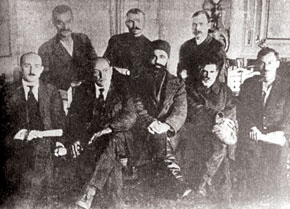 The first Central Executive Committee of the Azerbaijan SSR. From the left seated: T. Shahbazi, N. Narimanov, M. Hajiyev, C, Adgozalov; Standing: C. Fatalizade, V. Krilov, A. Andreyev (1921)
The first Central Executive Committee of the Azerbaijan SSR. From the left seated: T. Shahbazi, N. Narimanov, M. Hajiyev, C, Adgozalov; Standing: C. Fatalizade, V. Krilov, A. Andreyev (1921) But because party policy took precedence over national interests, the new leadership of Azerbaijan took a wrong and hostile attitude towards the Sultanovs. Khosrov Bay was later arrested and Sultan Bay came under serious pressure.
Armenian leaders also realized the mistake of the Azerbaijani Shura government on Zangezur. One of the extraordinary commissars of Azerbaijan in Karabakh and Zangezur, A. Qaragozov, published an article in the press in summer 1920 "On the Zangezur-Karabakh problem". The article has many interesting implications: it says that Karabakh and Zangezur are bound to Azerbaijan with firm economic links, while good roads connect them not with Yerevan, but with Baku. And these regions had no economic relations with Armenia.
It is also worth noting that then as now Armenian policymakers and researchers emphasized the close economic and cultural relations of Karabakh, Nakhchivan and Zangezur instead of admitting their historical Azerbaijani origin.
However, the Azerbaijani leadership began immediately to put into practice its historic statement of 1 December 1920 under which it opened all its wealth to Armenia. The war was not yet over, the Dashnaks had not given up their territorial claims on Azerbaijan and the atrocities against Azerbaijanis had not ended, but the Azerbaijani leaders provided "comprehensive assistance to a neighbouring and friendly nation".
Bibliography
K istorii obrozovaniya Nagorno Karabakhskoy Avtonomnoy Oblasti Azerbaydzhanskoy SSR, 1918-1925 (On the history of the formation of the Mountainous Karabakh Autonomous Region of the Azerbaijan SSR). Documents and materials, Baku, 1989
Archive of Political Parties and Public Movements of the Republic of Azerbaijan Kommunist newspaper, 2 December, 1920
Bakinskiy rabochiy (Baku Worker) newspaper, 3 December 1920
Konflikt v Nagornom Karabakhe (Conflict in Mountainous Karabakh) collection of articles, Baku, 1990,
Stalin, Eserleri (Works), Baku, 1947
Ordzhonikidze, Stati i rechi (Articles and Speeches), Vol.1, Moscow, 1956
Pravda newspaper, 4 December 1920
M.A. Rasulzada, Azerbaycan Cumhuriyyati (The Azerbaijani Republic), Baku, 1990
M.B. Mammadzada, Milli Azerbaycan harakati (The Azerbaijani National Movement), Baku, 1992
Mezhdunarodnaya politika noveyshego vremeni v dogovorakh, notakh i deklaratsiyakh (The Latest International Policy in Agreements, Notes and Declarations), part III, issue I, Moscow, 1928 Central State Archive of the Republic of Azerbaijan
